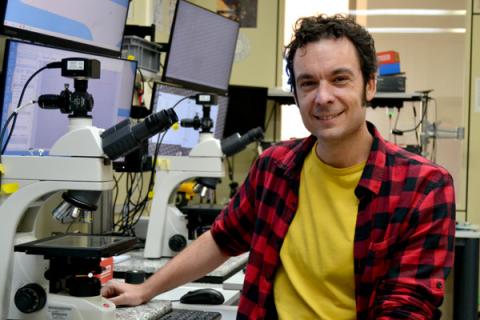Andrés Castellanos-Gómez, a new number academic at the Young Academy of Spain
The ICMM researcher has been chosen from 104 candidatures along with other 9 people.

Andrés Castellanos-Gómez, a researcher at the Institute of Materials Science in Madrid (ICMM), CSIC, has been selected, along with nine other individuals, to become a member of the Young Academy of Spain as a Full Member. The decision, which was announced on June 14th, was made on June 12th by the General Board of the mentioned institution, following the evaluation by an independent international committee.
According to a press release from the Young Academy of Spain, a total of 104 applications were submitted for this call, and the final selection took into account academic merits, the diversity of the candidates, and the multidisciplinary nature of their areas of work.
The nine individuals chosen alongside Andrés Castellanos-Gómez are Edgar Camarós I Pérez, María Casanova Acebes, Jaime de Juan Sanz, Irene Esteban Cornejo, Daniel García González, Diana Roig Sanz, Marta Sánchez de la Torre, Katherine Villa Gómez, and Ricardo Vinuesa Motilva. "Their profiles cover different fields of knowledge, including archaeology, philology, art, history, sports science, immunology, neurology, physiology, industrial engineering, mechanical and aerospace engineering, and materials study," the statement says.
Andrés Castellanos-Gómez is a scientific researcher in the 2D Casting group. His work focuses on novel 2D materials and studies their mechanical, electrical and optical properties with special interest in the application of these materials in nanomechanical and optoelectronic devices. Part of his work can be considered as pioneering in the field of 2D materials beyond graphene as he has reported some of the early works on novel 2D materials like MoS2, black phosphorus, TiS3, and franckeite. Among his achievements, his works on strain engineering of 2D semiconductors and on photodetectors based on 2D materials are considered seminal works by the community.
He is the author of over 140 international articles in indexed journals and 6 book chapters. He has led an ERC Starting Grant since 2017. Among other awards and mentions, he received the National Research Award for Young Researchers in 2022 and the Miguel Catalán Award, also in the 2022 call. He is also the recipient of the MDPI Young Investigator Award in Nanomaterials in 2021 and was selected as a member of the International Association of Advanced Materials (IAAM) in 2020. He is among the emerging leaders of 2020 in the special issue of the Journal of Physics: Materials and in the list of most cited scientists by Clarivate/WOS in 2018, 2019, 2020, and 2021. He was also selected in 2018 as one of the Emerging Investigators by Chemical Society Reviews and as one of the 10 Spanish Talents of 2017 by MIT Technology Reviews. He received the Young Researchers Award in the category of experimental physics from the Royal Spanish Society of Physics in 2016.
The Young Academy of Spain
The Young Academy of Spain has been in operation since 2019. Among its objectives are the promotion of science as a professional option among young people, providing scientific training through the promotion of knowledge, serving as a forum and platform for young researchers in Spain, and acting as a link between researchers within and outside the country. Membership in this institution is limited to five years, which maintains an average age of its 50 members. Every year, 10 new individuals are admitted to replace those whose membership has expired.
The Academy is based at the Center for Humanities and Social Sciences, belonging to the Spanish National Research Council (CSIC).
Instituto de Ciencia de Materiales de Madrid (ICMM)
Sor Juana Ines de la Cruz, 3
Cantoblanco, 28049
Madrid, España
Telephone: (+34) 91 334 90 00
Email: @email
Communication Office: @email

Acknowledge the Severo Ochoa Centres of Excellence program through Grant CEX2024-001445-S/ financiado por MICIU/AEI / 10.13039/501100011033

Contacto | Accesibilidad | Aviso legal | Política de Cookies | Protección de datos
